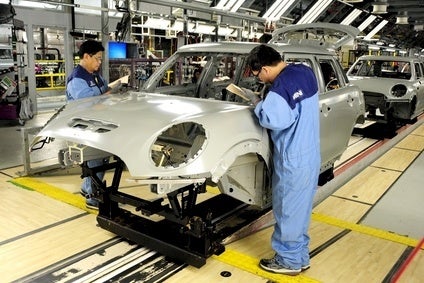
BMW board member Harald Krüger has told just-auto that Oxford will remain at the heart of MINI production plans in the future, but with the Dutch Nedcar plant at Born also an important addition for the long-term.
Krüger is BMW’s board member responsible for global group production and was speaking in Oxford as the MINI plant celebrated its 3-millionth unit coming off the assembly line. It has just added production of the 5-door hatchback.

Discover B2B Marketing That Performs
Combine business intelligence and editorial excellence to reach engaged professionals across 36 leading media platforms.
“In the future, we will have two manufacturing locations for MINI: Oxford and Born,” he said.
“That gives us enough growth and flexibility to serve the worldwide network.”
Krüger said that MINI has annual production capacity of 260,000 units at Oxford. “We are running three-shifts at Oxford and can produce around 1,000 units a day. With two plants in the long-term, that gives us plenty of flexibility.”
Krüger said that BMW’s partnership with Magna Steyr in Austria will continue – the Graz-based contract assembler currently builds the Paceman and Countryman MINI models – but that contract is coming to an end (some estimates say likely to finish in 2016). Magna Steyr formerly built the X3 for BMW and the future allocation of production of BMW Group models for contract assembly by Magna Steyr is yet to be determined.
There is also some uncertainty of on the precise timing of the cessation of the two MINI models currently made in Austria that would be moved elsewhere. “The run-out [on MINI models] is not fixed,” Krüger said. “That depends on markets, demand and supply.”
Krüger stressed the planned flexibility of MINI’s future manufacturing set-up with two plants serving global markets.
“We currently have five models made here at Oxford,” he said. “That flexibility is very important. We have just added the 5-door hatch and we are very excited about that because we know that it will take MINI to new customers who want 5-doors.
“But in the future, we want to be able to adjust the production mix according to demand and we can do that. The 3-door hatch is also built at Nedcar and that is very important for flexibility. We could, in the future, build more 5-door hatches at Oxford if we want to and transfer some 3-door hatch production to Nedcar. Having the 3-door made at two locations gives us flexibility on our derivatives mix according to the evolution of market demand.
“The 3-door is the core of the brand, but we know a lot of people in some markets will be attracted to the 5-door. We can respond accordingly,” he added.
Asked about possible future manufacturing of MINI models in emerging markets, Krüger firmly stuck to the line that the long-term manufacturing strategy for the brand is based on the locations of Oxford and Born. “It also makes sense when you look at the supply chain,” he pointed out. “Born is not very far from Oxford, in global terms, and that means we can stick with our European supplier base for all MINI production. That creates some very big benefits in terms of scale economies that can be exploited. If we move production around the world, we would lose those benefits.”






